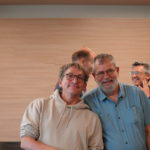Since the 19th century, Geneva has been a center for visionary thinkers dedicated to advancing health and ethical standards.
In the second half of the 19th century, struck by the plight of the wounded in fighting armies, Henri Dunant, Guillaume Henri Dufour, and Jakob Dubs joined with other citizens of Geneva to improve conditions for those wounded during wartime. At that time, the wounded were often abandoned, suffering and dying in horrific conditions on the battlefields.
After returning from the battlefield of Solferino, Henri Dunant devoted himself fully to the cause of aiding the wounded. He persuaded his friends in Geneva to champion this cause and to establish a humanitarian aid organization. This commitment sparked a tradition of support from Geneva’s patrician families, laying the foundations of international Geneva.
Jakob Dubs, Madame Brocher’s grandfather, was a Zurich politician who collaborated with his friends in Geneva to develop the project that led to the founding of the ICRC in 1863 and the Swiss Red Cross in 1866, advancing the initiative to both federal and international levels. Extending this effort to include aid for civilian casualties united the citizens of Geneva and Switzerland in support of this major humanitarian cause.
A distinguished jurist and Swiss politician, Dubs served on the Federal Council from 1861 to 1872, and held the office of President of the Swiss Confederation three times during this period (1864, 1868, and 1870). He presided over the August 22, 1864 conference, which established the first Geneva Convention for the protection of wounded soldiers. As the first President of the Swiss Red Cross, Dubs devoted much of his life to political efforts to uphold the rights of the wounded in wartime.
In establishing the Foundation, Jakob Dubs’ granddaughter sought to honor her grandfather’s dedication to the right to health, continuing his legacy. She and her husband, Jacques Brocher—a physician himself—committed to carrying forward this mission into the 20th century. Energetic and highly skilled in management, Mrs. Brocher enlisted top advisors to oversee their fortune and family assets. As residents of Geneva, she and her husband were able to leave a remarkable estate and capital that now serve as a hub for researchers from around the world.
In the 21st century, the Foundation embraces a modern vision of its mission. Its scientific focus, set by the Foundation’s Board of Trustees, addresses new challenges surrounding health and patient rights in a globalized world.
Committed to upholding the humanistic and altruistic goals of its founders, the Foundation has become a leading force in the fields of ethics and health, particularly within the context of biotechnology and the complexities of health governance on both national and global scales. The Board relies on a small, dynamic team to efficiently manage and optimize the Foundation’s resources.
The Foundation is actively building a wide range of partnerships to advance its mission and secure its sustainability. Much like Jakob Dubs, who united politicians and citizens around humanitarian ideals, and the Brocher couple, who expanded their impact by opening the Brocher Estate to the scientific community, the Foundation today upholds this vision, welcoming both researchers and the public alike
It is a vibrant hub for exchanging ideas on the health challenges of the 21st century, serving as a bridge between the scientific community, international Geneva, and the public.








